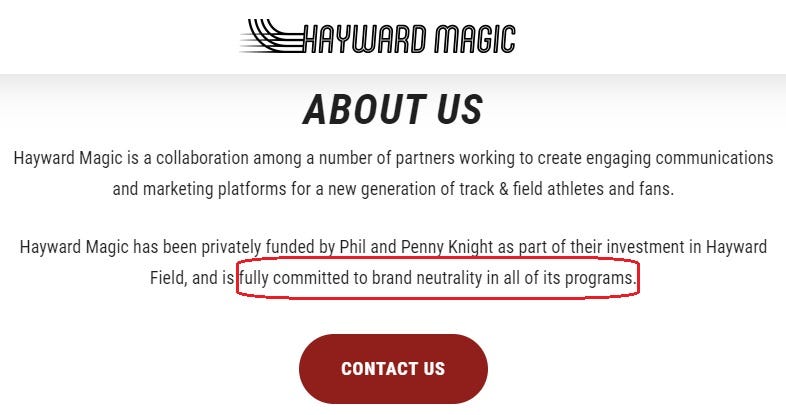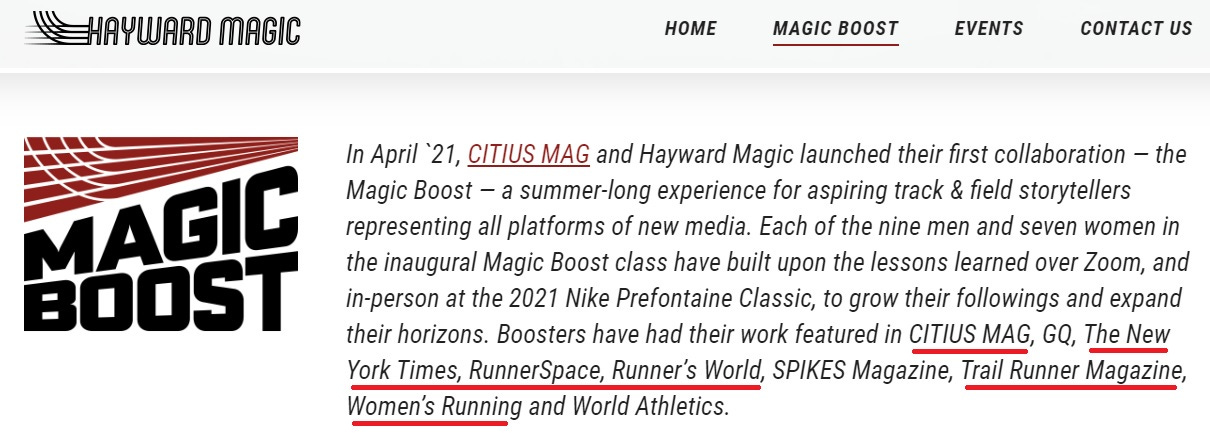While pushing the value of elite-runner autonomy, the WaPo omits its biggest benefits
Not having to compromise your values to serve a cackling orc of a dungeon-master like Phil Knight seems like a tangible mental-health perk
A July 5 Washington Post article titled “These elite runners say having a full-time job helps their performance” was filed under the heading “Wellness” rather than “Sports.” That’s probably part of the reason the article presents a good thesis—that elite runners should consider supporting themselves financially rather than sign contracts with shoe companies—while failing to make its most obvious supporting arguments.
The story emphasizes that working stiffs who compete at or near the top level, like schoolteacher Carrie Verdon and nurse anesthetist Sarah Sellers, “may have something to teach runners of all levels about how sports-life balance can improve performance.” The author, Kelyn Soong, proposes that this is because “running often becomes an escape rather than an all-consuming career” for these unsponsored athletes and allows them to develop an identity apart from competing.
The piece is rich in the usual vague promises (“athletes can experience a performance enhancement if they allow themselves to be more well-rounded”) and New Agey vernacular (athletes are “holistic beings who desire to excel and to thrive”), but manages to effectively retain the take-home message: If you’re relaxed and well-integrated into your own life—making your own choices about where to live and run, when to work out, and what to do for fun—then you are more likely to succeed than if beset by running-related stressors that chase you back into the house after every run and help shape your occasional nightmares.
I won’t waste time explaining how easy it is for someone with a college degree, or not, to find a non-physical job sufficient to pay the rent and in many cases considerably more. I did my best running, and enjoyed racing the most, when I was working full-time (and sometimes more than that) and enjoying fruitful personal relationships both within and outside running. And while I wasn’t close to world-class, I would have been had I gotten ahead of the game and declared myself female twenty years ago, and I was putting in the same amount and kind of work as a typical elite marathoner.
There are a number of obvious reasons for a world-class runner to not sign with a shoe company, and the most powerful shoe company of them all makes those reasons explicit to anyone paying attention to the scene. One of them is the freedom to interact with the media on your own terms—to retain your First Amendment rights on the job. If you choose to run for any of the major brands and have sane ideas about doping, who belongs in women’s or girls’ races, or anything else, you might piss off the demented post-liberal-leftist Twitter borg currently shaping companies’ Wokish marketing choices, so you get to keep those ideas to yourself. And if you don’t feel like giving interviews to people like Women’s Running überkünt Erin Strout, who actively agitates against the interests of elite female athletes, and Citius Mag creator Chris Chavez, who’s practically illiterate and has the journalistic ethics and acumen of a drunken basset hound, you get to talk to them anyway. (I allow for the fact that some athletes are willing talk to gomers like these without contractual obligations or informal coercion.)
Being a corporate entity itself—in this case one owned by someone who manages a great many vans, warehouses, and wet dreams about the moon as well as a nationwide army of de facto slaves—the Post is never going to publish a story extolling the virtues of freeing yourself from corporate obligations. It was among the many leading media outlets last June that aggressively pushed Shelby Houlihan’s ridiculous burrito excuse as credible.
The Post also famously employs Taylor Lorenz, a genuine menace and continuously lying sleazebucket of privileged white victimhood. Operating without a contract means having the freedom to say exactly what you think about pals and emulators of Lorenz at The New York Times like sociopathic zombie and fame-coveter Lindsay Crouse.
The corporate media ginning up support for Houlihan, who produces tears and looks like every other woman from Iowa except for LoLo Jones, was automatic. I also have little doubt that Nike exerted control over the tone of the Houlihan stories across media outlets in addition to supplying those outlets with lies about the details out of the gate.
To appreciate the running-media landscape going into the 2022 World Championships, which unfortunately will take place on U.S. soil starting tomorrow and continuing through next Sunday, consider the money that Nike chairman emeritus Phil Knight, now worth upward of $50 billion, has handed to a host of competing media outlets.
The thing about brand neutrality should come with an embedded laugh track. But it wouldn’t matter even if Knight were serious about this, because he benefits from a cohort of “journalists” who already think of nothing but impressing people like Phil Knight. And even if he didn’t exist, everyone who wants to be recognized as a name in running is petrified of getting on the bad side of any of the big track clubs, especially Knight’s latest Portland-based gang of PED-o-philes, who can speak glibly of their “RED-S” now that they all have their thyroxine dosages better calibrated.
No one will get a story published in any mainstream outlet that takes a hard look, say, the various suspicious athletic trajectories—often in the face of serious injures—of members of the Bowerman Track Club, or how ridiculous it is to have transwomen and other non-women competing against women. In fact, every story of malfeasance emerging from the BTC will be as sanitized as possible moving forward. The only outlet on the above list I trust to produce objective content under duress is the online version of Runner’s World, and that’s only if Sarah Lorge Butler stays. She’s responsible for every good story that outlet has published for years, and I don’t think she fundamentally gives a rip what Phil Knight thinks.
Back to the life of a working top-level runner. You can afford shoes, gear, food, and travel. You can live where you feel like you’ll be happiest and choose to spend more of your non-running time doing and thinking about things you like. You’ll be less inclined to worry about your social-media accounts if you’re not sponsored (and might even evince the wisdom to not maintain any).
You won’t be a frequent subject of drama-threads on the Letsrun.com message board, and you may never have to meet any of the idiots who regularly post there. You can choose what races you want to run, and if you’re fast, you’ll still get comped entries and travel money. You can pick your own coach.
Training partners? Not everyone likes those or thrives on their presence. But if you’re female, you can find schlub-level 15:00 5K guys to do speed sessions with no matter where you live. If you’re male, you can pull a Ben True—who should get to run professionally forever, given what he’s brought to the sport—and literally hire someone to stay in around 13:45 shape and help push and pull you around the track on interval days.
If you’re this kind of runner, you’re probably not inclined to dope your way to top success anyway. But if you are, you can still find and afford performance-enhancing drugs. The one thing you will not get if you spurn the shoe companies, however, if protection from the consequences of that using—the same free ride a lot of athletes clearly enjoy for years.
Houlihan is not upset because she didn’t dope. She’s not surprised she peed hot, either. What bothers her is why the World Anti-Doping Association wound up doing its job in her case, when she knows that WADA is not supposed to do its job except when certain athletes male themselves disposable through some combination of advanced age and getting on someone’s bad side (the saga of C.J. Hunter’s and Marion Jones’s suspensions are a case study in annoying exactly the wrong people).
Any elite runner who decides to freelance will not be able to consistently beat dopers from the U.S., Ethiopia, Kenya, Norway, or anywhere else. That means that to really have it all—total independence and gold medals—such a runner would have to be doping. And there is no way someone who thumbs their asshole at someone with fifty fuckin’ billion dollars is going to get away with beating the billionaire’s dopers. That just won’t happen.
I could probably get most people to agree with me that Keira D’Amato would not have set an American record in the marathon in January had she not signed a contract with Nike in February 2021. But I wonder how many of those people could be convinced that it wasn’t any magic racing flats she got, or access to better coaching, or more time to sleep. It was the luxury of being able to run 2:19:12 on extremely low mileage and after a subpar year and have the result stand as valid, and therefore see a lot of people treat it as legitimate. I’ll never believe D’Amato is clean—hell, she operates in a part of the country where status-chasing makes Manhattanites look monastic, and the whole happy-mommy thing is a sham—and I’ll never believe the top BTC runners are, either. When you sign a shoe contract, at least with the company everyone automatically thinks of first, what you’re getting is a free pass, within limits, to do what it takes to set national and world records.
So, contract-free runners may not quite be able to have it all. If they could, such set-ups might be more common, even though Nike and others can offer a good sell to any 23-year-old who’s never had a real job. But it would be nice to see more 27:30/2:08 and 31:00/2:23 types directing their own shows throughout their careers and retiring with their dignity intact, even if their trophy cases don’t fill up as impressively as those of certain Oregonians.





